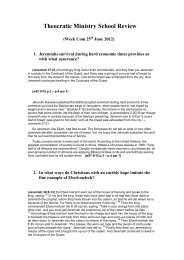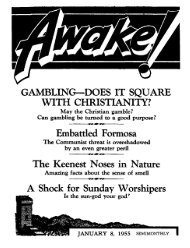1964 Awake! - Theocratic Collector.com
1964 Awake! - Theocratic Collector.com
1964 Awake! - Theocratic Collector.com
You also want an ePaper? Increase the reach of your titles
YUMPU automatically turns print PDFs into web optimized ePapers that Google loves.
will appreciate the Spanish equivalent,- "to<br />
sleep at loose leg."<br />
When a little one grows up into a<br />
yOWlg lady and attends dances, she will<br />
be a "wallflower" at an English-speaking<br />
party if no one asks her to dance, for she<br />
may as well be one of the decorations on<br />
the wall. However, at a Spanish f/£sta<br />
chances are she will remain seated all<br />
evening if no one invites her to dance, and<br />
this is referred to as "to iron the seat."<br />
Some well-meaning young man may undertake<br />
to teach the lonesome young lady<br />
to dance without stepping on her partner's<br />
toes, but he may have taken on a job that<br />
is too big for him. So an English-speaking<br />
<strong>com</strong>panion may suggest that he has "bitten<br />
off more than he can chew." Can you<br />
imagine the struggles of one trying to wear<br />
a shirt made of eleven yards of cloth? If<br />
so, you can easily picture why his Spanishspeaking<br />
friend may suggest that he has<br />
"gotten himself into an eleven-yard shirt."<br />
To "burn the midnight oil," of course,<br />
means one is working unusually long hours<br />
into the night to ac<strong>com</strong>plish some task.<br />
However, if you use a candle instead of<br />
an oil lamp you may well "burn the eyelashes,"<br />
as the Latin American might say.<br />
If you suddenly find that the task will require<br />
more effort than you are willing to<br />
expend, you may say, "That is a horse of<br />
a different color." Horse trading may not<br />
be so <strong>com</strong>mon in certain parts of the<br />
Spanish-speaking world, but flour of varying<br />
quality is a <strong>com</strong>mon part of life, so it<br />
means the same thing in Spanish to say,<br />
That is "flour from another sack."<br />
When your partner be<strong>com</strong>es angry and<br />
explosively loses his temper at you for<br />
having changed your mind, your description<br />
of him will be determined by your<br />
background. The English-speaking world<br />
has its Irish and the Spanish its Indian. So<br />
if he is English he "got his Irish up," or if<br />
'Spanish, "the Indian climbed up in him."<br />
SEPTEMBER 8, <strong>1964</strong><br />
Extemion of Viewpoint<br />
Gems of wisdom have been condensed<br />
into proverbial sayings in nearly every<br />
language, and Spanish is especially rich in<br />
them. Entire conversations can be carried<br />
on in Spanish with proverbial sayings.<br />
These brief expressions often settle a conversation<br />
or sound out viewpoints on delicate<br />
subjects. Sweethearts may demonstrate<br />
remarkable ingenuity at this game.<br />
Where there are similar proverbs in the<br />
two languages, Spanish frequently extends<br />
the thought.<br />
If, for example, your neighbor wants to<br />
trade you some corn that he has only just<br />
planted for some beans you have already<br />
harvested, your English reply may well be,<br />
"A bird in the hand- is worth two in the<br />
bush," or, in Spanish, "Of more value is<br />
a bird in hand than a hundred flying." If<br />
you were not wise and you lost heavily in<br />
the foolish bargain, in English you may<br />
be said to have been "fleeced." The Latin<br />
mind, with its keen insight into human<br />
nature, recognizes that the victim may not<br />
have had the most blameless of motives<br />
himself, perhaps even being a bit greedy.<br />
So it is said, "He went in after wool and<br />
came out fleeced." Such kind of persons<br />
are not un<strong>com</strong>monly found in one another's<br />
<strong>com</strong>pany, for "birds of a feather flock<br />
together." But where great flocks of birds<br />
are not so <strong>com</strong>mon, Spanish observers may<br />
be heard to say, "They are faxes from the<br />
same pineapple patch."<br />
Persons who have be<strong>com</strong>e noted for certain<br />
characteristics may find it difficult to<br />
change; in fact, others may view this<br />
change as impossible. From the Middle<br />
East, where there were leopards, came the<br />
expression, 'Can a ... leopard change its<br />
spots?' (Jer. 13:23) In Spanish-speaking<br />
tropical countries the people may be more<br />
familiar with monkeys and use this <strong>com</strong>parison:<br />
"Although she dresses herself in<br />
silk, monkey she remains." Familiarity<br />
15




